The https://english.atlatszo.hu use cookies to track and profile customers such as action tags and pixel tracking on our website to assist our marketing. On our website we use technical, analytical, marketing and preference cookies. These are necessary for our site to work properly and to give us inforamation about how our site is used. See Cookies Policy
Atlatszo.hu publishes report which confirms that government attacks are unfounded
Transparency advocate Atlatszo.hu has obtained and published an audit report that the Hungarian government argues exposes illegal practices in the use of financing from the Norway Grants. A review of the material shows that the government’s claims of wrongdoing are unfounded and based on a deliberate misreading of the findings contained in the report.
The Hungarian government is continuing its campaign against several NGOs which receive funding from the Norway Grants, claiming that the money is distributed illegally and is serving political purposes, making the Hungarian recipients proxies of foreign interests.

The latest installment in the saga took place at the end of June, when deputy state secretary Nándor Csepreghy announced to the press that a regular audit report compiled by international financial consultancy Ernst & Young identified several anomalies which provided justification and grounds for considering filing criminal charges for embezzlement. Atlatszo.hu also obtained the final draft of the report and made it public, clearly showing that the government’s claims are unfounded.
Csepreghy claimed the report found that the committee evaluating the distribution of the grants is not independent and that there is a conflict of interest as the people approving the funding are in many cases also the beneficiaries.
In fact, the report does identify areas of improvement in the evaluation process, in particular the need to eliminate overlapping project goals and the lack of a proper level of detail in some documentation. However, the final conclusion is that the programme is operating in line with the defined goals, and that the organizations and people charged with the task are performing well in all operative and administrative tasks involved.
Shortly after the Fidesz party was reelected in the 2014 general election, the Minister in Charge of the Prime Minister’s Office, János Lázár, launched what is best described as a crusade against the NGOs receiving Norwegian funding. The organizations have been accused of being political tools of a foreign power, and have also been targeted for official investigation by KEHI, the ‘Government Control Office’, the agency responsible for auditing Hungarian public funds.
Atlatszo.hu, along with many other NGOs affected, has raised objections to the procedure and refused to cooperate with KEHI’s demands to hand over documents. Instead, Atlatszo.hu argues that KEHI has jurisdiction over government agencies, and as such its scope does not include NGOs. Having nothing to hide, Atlatszo.hu made all the required information public, in association with the Asimov foundation.
The anti-NGO campaign is consistent with on-going government efforts to redirect the flow of information as well as to reshape relations with the media. Besides cracking down on NGOs such as atlatszo.hu, which promote transparency and expose the illicit use of public funds, government pressure has also been linked to the ‘reshuffling’ of one of Hungary’s leading news portals which had been looking into how government officials spend their allowance, not to mention a new tax that is being carefully tailored to financially cripple the country’s biggest and most popular commercial broadcaster.
Share:
Your support matters. Your donation helps us to uncover the truth.
- PayPal
- Bank transfer
- Patreon
- Benevity
Support our work with a PayPal donation to the Átlátszónet Foundation! Thank you.
Support our work by bank transfer to the account of the Átlátszónet Foundation. Please add in the comments: “Donation”
Beneficiary: Átlátszónet Alapítvány, bank name and address: Raiffeisen Bank, H-1054 Budapest, Akadémia utca 6.
EUR: IBAN HU36 1201 1265 0142 5189 0040 0002
USD: IBAN HU36 1201 1265 0142 5189 0050 0009
HUF: IBAN HU78 1201 1265 0142 5189 0030 0005
SWIFT: UBRTHUHB
Be a follower on Patreon
Support us on Benevity!

